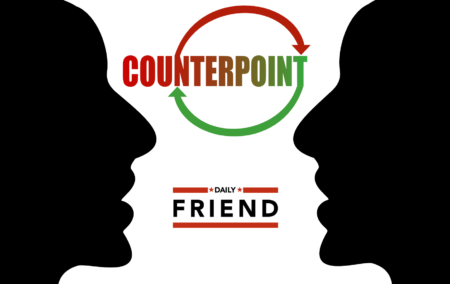‘That which purifies us is trial, and trial is by what is contrary’ John Milton, Areopagitica (1644)
Counterpoint, a new occasional feature on the Daily Friend, seeks to match the wisdom Milton expressed in his great defence of free speech: that the best ideas emerge from scrutiny and argument. Guest opinions expressed in this column are not necessarily those of the Daily Friend or of the IRR.
There is so much instability in the country. Everything seems to be in flux. People are so corruption-weary that some have given up reading newspapers or watching TV. We are so depressed that have begun to wonder if we are a failed state without bothering to check what constitutes a failed state.
It is generally agreed that a failed state refers to a country whose government has lost control of the political or economic system and is so weak that it is unable to fulfil its basic responsibilities. In other words, it has lost its legitimacy.
Judging whether or not we are on our way to being a failed state means requires an assessment of our social contract. Against the Hobbesian yardstick, Rachel Adams defines our social contract as an ‘implicit agreement between people to establish a new SA society, founded on universal suffrage, equality, inclusivity, and democracy to benefit all’. For all intents and purposes, the citizens agree to surrender their absolute freedoms and subject themselves to law and order in exchange for social security and the protection of property from the state. Undoubtedly, security via the enforcement of law and order by the state is the cornerstone of the contract.
South Africa, however, is one of the most kleptocratic governments in the world. By 2019, the Corruption Perception Index (CPI) placed South Africa 70 out of 180 countries. During former president Jacob Zuma’s reign it is estimated that R1.5 trillion was looted. This constitutes a third of the R4.9 trillion 2019 budget.
Cyril Ramaphosa’s campaigning mantra for presidential office was his promise to combat corruption within the African National Congress (ANC), and the country as well. It is this promise that enabled him to clinch 58% of the vote in last year’s elections, vowing in his victory speech to win the war against corruption whether ‘some people like it or not’.
Whether he is winning the war against corruption is a moot point. That he has managed to clean up the South African Revenue Service, the National Prosecuting Authority, and the Directorate for Priority Crime Investigation (HAWKS), and appoint credible heads is commendable. All these institutions were hollowed out during Zuma’s corrupt administration.
National and global coverage
Of all corruption allegations against ANC cadres, none have received as much national and global coverage as those associated with contracts for Covid-19 Protective Personal Equipment (PPE).
That the office of the President was not unscathed, given the suspension of his spokesperson, Khusela Diko, has surely contributed to the wide publicity of this debacle. So rattled, and embarrassed, was the president that he called on the Special Investigative Unit (SIU) to investigate those involved, calling them a ‘pack of hyenas circling wounded prey’. World Health Organisation chief Tedros Ghebreyesus aptly condemned Covid-19-related corruption as ‘murder’, given the risks to the lives of patients and health workers. Of great concern are claims that the quality of PPEs was compromised in the pursuit of profit.
The Covid-19 PPE corruption scandal came on the heels of councilors across the country being hoarding food parcels they were meant to distribute to indigent citizens to alleviate lockdown-induced poverty.
The path towards failure is highlighted by the news that municipalities (76%) across the country are on the verge of collapse. Given the bleak 2018/2019 audit report by Auditor General Kimi Makwetu in July – showing that only 13 (8%) out of 278 municipalities received clean audits – this is not surprising at all. In the Eastern Cape, only Senqu municipality – one out of 37 municipalities – received a clean audit. Irregular expenditure rose from R2.5 billion to R11 billion in just three years. Makwetu attributes this waste to ‘very weak accountability and the consequent exposure of the public purse’.
Viewing pandemic-related corruption, manifest at municipal, provincial and national level, in the context of the forecast that government debt of 62.2% in 2019 is expected to balloon to about 90% by 2021, one can safely aver that we are on a slippery road to a failed state. With corruption spiraling unchecked, it is no wonder the state is in the red, as the president recently confirmed.
Chilling
Juxtaposing corruption with unrest statistics is chilling, for it suggests we are sitting on a time bomb of massive social unrest.
The recent Clicks imbroglio, notable for the government’s lethargy in responding, is a warning of the risk of anarchy. The government is fast becoming unable to protect either the people or their property – the bedrock of the social contract.
As things stand South Africa risks becoming a homo homini lupus (‘Man is wolf to man’) state not unless law enforcement agencies bring the kingpins of corruption to book.
The lack of trust in government institutions being able to execute their legitimate obligations is becoming more pronounced by the day. That even Covid-19 PPE funds have been embezzled underscores not only the moral decadence of the government, but its atrophy in stemming the pillage.
Never has there be a need as now for a competent and strong democratic opposition party, with strong civil-society backing, to wrestle power from so a feckless government seemingly devoid of the capacity to maintain its part of the social contract.
The views of the writer are not necessarily the views of the Daily Friend or the IRR
If you like what you have just read, subscribe to the Daily Friend

